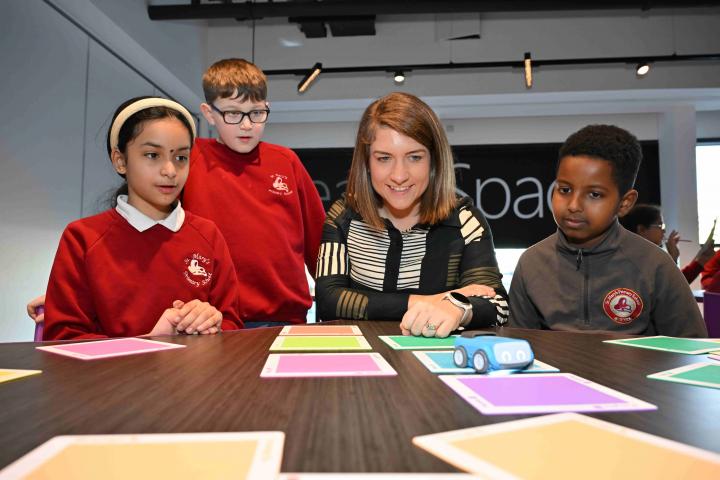
Microsoft Announce Expansion of Dream Space Teacher Academy designed to Embrace New Teaching Models and Grow AI Literacy
Microsoft Ireland today unveiled research on the use of digital technologies and AI in Irish classrooms, and to announce the expansion of the Microsoft Dream Space Teacher Academy, a free programme designed to empower teachers with the skills to effectively and responsibly use AI and digital technologies in the classroom.
Powering new teaching models
The research entitled, ‘Digital Learning in the Era of AI’, reveals how AI and digital technologies are helping to enhance learning and engagement in the classroom. Conducted by 3Gem for Microsoft, the survey of 201 educators across Republic of Ireland and Northern Ireland found that:
While AI is one of the key technologies that teachers are embracing to enhance education and 64% of teachers believe it will positively transform education, adoption varies across the island of Ireland. In Northern Ireland, 74% of teachers report rapid uptake of generative AI, compared to 33% in the Republic.
Digital Tools and AI in Classrooms: Opportunities and Challenges
When asked about ways to bring technology and AI into the classroom, the top three suggestions agreed on by teachers include collaborative learning (49%), student-led initiatives (47%), and project-based learning (41%), approaches that are at the centre of the approach taken by the Microsoft Dream Space team.
Related: Building enterprise GenAI infrastructure: Lessons from Liberty IT's digital transformation
The research also highlights a growing integration of digital tools in classrooms, from online worksheets to interactive quizzes, with more experienced teachers using a broader range of tools compared to newer teachers. However, adoption is uneven, especially in schools slower to embrace AI. While 83% of surveyed teachers agree they have not received adequate training to use tech and AI tools effectively, this issue is more pronounced in schools slower to embrace AI, where 67% cite insufficient training as a major barrier, compared to just 32% in faster-adopting schools.
Most educators report student use of laptops, tablets, or computers during lessons. In digitally advanced schools, 40% say devices are used in most teaching, compared to just 15% in slower-adopting schools. Overall, 26% of teachers report high usage (over 75% of teaching), while 51% report moderate use.
Generative AI has seen the fastest growth among digital tools in the past year, marking a shift in teaching approaches. Adoption also varies by location: 64% of urban educators describe their school’s digital transformation as fast or very fast, compared to 45% in suburban and 34% in rural schools. Teachers who use digital tools extensively are more likely to report rapid adoption (74%) than those who use them rarely (30%).
Despite these advances, confidence gaps remain, particularly among non-STEM teachers – only 18% feel fully equipped to use digital technology effectively in the classroom. Even among STEM educators, many report that a lack of ongoing support has limited the impact of their training.
In fact, 81% of teachers say they are lacking formal training in AI, and there is strong consensus among school leaders (92%) that AI training should be a mandatory part of both initial teacher education (ITE) and continuing professional development (CPD).
Microsoft Dream Space Teacher Academy*
To help address the research findings and support teachers to leverage AI and digital technologies to enhance learning and engagement in the classroom, Microsoft today announced the expansion of its Dream Space Teacher Academy for the 2025/2026 academic year. This free, multi-week programme is designed to help primary and post-primary teachers begin their journey with AI in education. It focuses on building confidence and understanding, starting with the basics of how AI works and why AI literacy matters.
Teachers will explore how AI can support productivity, learn how to use it responsibly and ethically, and access resources to help students develop their own AI literacy and future-ready skills. On completion, participants will earn a digital badge via Credly, with opportunities for further professional development and accreditation.
James O’Connor, Microsoft Ireland Site Leader and Corporate Vice President of Microsoft Global Operations Service Centre, added: “Microsoft is committed to supporting Irish educators to bring a digital mindset into the classroom to enhance learning and student engagement. This research shows that teachers are ready to embrace AI, but they need the right support to do so confidently and responsibly. As the new guidance on the use of AI in the classroom highlights, it’s not just about having access to digital tools; it’s about understanding how AI works and how to use it in ways that truly benefit students.
“That’s why we’re expanding the Dream Space Teacher Academy and investing further in our ambition to Skill Up Ireland. We are committed to helping teachers build the skills, trust and AI literacy they need to confidently use AI in the classroom. By focusing on responsible use, digital understanding and practical classroom application, we hope to support educators to create more inclusive, engaging and future-ready learning experiences for every student across the island of Ireland.”
Read the Big Data Special Edition free online →
Stay connected with NI's tech community:
Subscribe to our newsletter – Get the latest tech news, job opportunities, and events delivered to your inbox
Visit Sync NI – Your daily source for Northern Ireland technology news